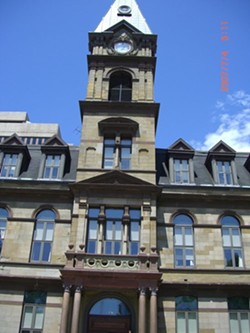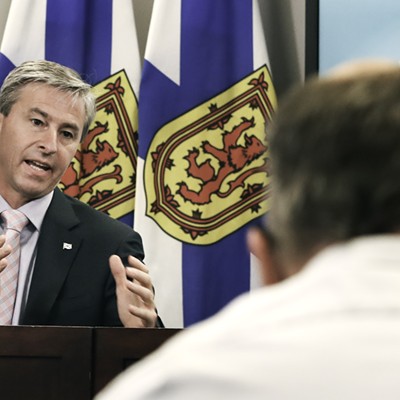Tuesday’s council meeting was the first since December 11, and only the sixth of the council that was elected in October. This means that the political balance between new districts and a new mayor is still being worked out, and the reelected councillors, or at least some of them, are doing some fierce turf-protecting. More on this in a bit.
Burnside expansion
During the election campaign, much was made of the need to align city policy with supporting downtown. Tuesday, council dealt with a $7 million expansion of the Burnside Business Park. My first reaction to this was, What the fuck?! You just spent eight months saying how much you love, love, love downtown, now you’re going to expand Burnside, which undermines downtown?Turns out, however, that it’s a bit more complicated than that. It’s true that council has repeatedly, for over a decade, funded repeated expansions of the Bayers Lake and Burnside parks, which have served to cut the legs out from downtown. That’s because these expansions included lots of retail commercial and, especially, office space. As long-serving Spring Garden Area Merchants Association president and current North End Business Association president Bernard Smith has pointed out, these past expansions were often flat-out grants of free land to big box corporations, and even when that practice was ended, the land sales are respective tax assessments are still hugely under-valued because the past give-aways haven’t been factored in.
The argument for continually expanding the business parks has been that we want to make HRM so business-friendly that any conceivable business that might want to set up here needs the full range of land options to choose from, or they might set up in Moncton or whatever instead. I’ve always thought this is a silly argument, but I’ll let that be.
It’s also true that, on paper at least, the business park expansions are self-funded: the needed improvements to infrastructure like roads and sewers and street lights and (as an afterthought) sidewalks are paid for through the land sales. But this is bogus accounting, because it doesn’t consider the impact on the rest of the city. On the one side are the costs of expanding services that aren’t part of the immediate infrastructure of the parks, like police services, transit and impacts on roads. On the other side is the post-expansion effect on businesses that exist outside of the parks, lost sales and therefore, ultimately, lower property tax receipts.
Despite that, city rules don’t allow for council to take money in the business park capital accounts and apply it instead to downtown. Tuesday, there simply wasn’t the option for council to say no to the $7 million Burnside expansion and instead use the money for, say, tearing down the Cogswell Interchange or paying for all the wonderful streetscaping proposed in the Public Lands Plans for downtown.
Just as a broken clock is right twice a day, Chronicle-Herald business commentator Roger Taylor last Monday correctly called out the Burnside expansion proposal, echoing concerns I raised many years ago. Taylor’s column caused Tuesday’s council discussion to focus around how very wrong Taylor was.
City staff told councillors the competitive concern for downtown is misplaced, because all the land being made available for development in Burnside is for industrial operations. Retail and office space won’t be allowed, they assured.
With that assurance, council went ahead to approve the expansion unanimously (except Linda Mosher hadn’t arrived at the meeting yet).
This is where the wizened and cynical reporter points out that councillors who actually believe staff on things like this are, well, fools. We’ll see how this actually plays out, but repeatedly we find staff assuring councillors that their worst fears are misplaced only to find out that their worst fears weren’t fearful enough. Let’s just say I remain unconvinced.
Councillor discretionary funding
Later in the meeting, council dealt with the issue of how to distribute a few thousand dollars in unspent “District Activity and District Capital Funds” leftover from before the election. These are the discretionary funds that councillors can direct to local non-profit agencies or towards needed capital projects as they deem necessary.It was a bit of a pickle, in that some councillors were reelected, but had new districts when the former 23 districts were reformulated into 16 districts. Matching funds to councillors would result in one arrangement, while matching them to geography would result in another.
The proposed, and adopted, resolution of the problem seems to make some sense, and it’s not much money in any event, so I’ll spare you the details.
But council failed to address what I consider the most fundamental issue involved with the funds: the necessarily political unfairness of them.
I actually see some value in a sort of district slush fund. Councillors do indeed have deep knowledge of the districts they’re elected to, and arguably can respond to needs in a timely fashion that can elude the full city bureaucracy.
But in practice, the entire system becomes politicized. Councillors refer to the district funds as “my money,” just as they refer to the districts they’re elected to as “my district,” as if they’re running a little fiefdom. And the little grants of $500 or $1,000 to the local boy’s and girl’s club or to the local soccer league, are spoken of like this: “I gave $500 to...”. And certainly, the recipients understand the grants in the same way: “Councillor X gave us $400....”
The problem, then, is that the slush funds give incumbent councillors a political edge over future challenges by candidates who have not had the benefit of taxpayer-provided slush funds to dole out to community organizations.
I wouldn’t be opposed to doing away with the slush funds completely, because the small dollar amount of the grants aren’t make-or-break events for community organizations that, besides, have other avenues for raising money. But, for the sake of argument, and realizing that there is at least some value in having a quick responsive fund made available by district, I’ll suggest that councillors should at least tweak the system.
First, for dawg’s sake, stop referring to the slush funds as “my money.” It’s not yours. It’s taxpayer money. Respect it as such.
Second, find another avenue for disbursement of the funds. Either have the decision making handed completely to an apolitical actor, like a judge or a retired councillor, or develop a system such that community groups and citizens can decide the disbursement of the funds for themselves, with no influence from the councillor.
There won't be much political will to change things around, as there is simply too much incumbent benefit in the existing system. Perhaps a newly elected mayor with a mandate for change can prod the system along.
Halifax Water
While the reelection of 13 incumbent councillors from the Worst.Council.Ever was somewhat dispiriting, a bright spot in the election is the three new councillors. Waye Mason, representing the south end and downtown, and Steve Craig, representing Sackville, have proven to be especially dynamic, and have hit the ground running. I’m still reserving judgement on Matt Whitman, from Tantallon, mostly because the whole reverse-networking thing weirds me out, but I’ll give him this: he’s happily engaging.This week, Mason brought forward some sensible suggestions that basically come down to requiring staff to submit council reports early enough such that councillors can actually read them before a meeting. For this, councillor Russell Walker fell into full-on who’s this young whippersnapper? mode, raising absurd objections. Several other councillors did as well but, in the end, wisdom prevailed and councillors voted unanimously for Mason’s suggestions.
The real fireworks of the meeting, however, came when Craig suggested that council have a hard look at its relationship with Halifax Water.
Used to be, the water department was a simple division of the city bureaucracy, like roads, parks or recreation. There were a lot of problems with this system, but in the end there was at least the theoretical possibility of political accountability: if something went majorly wrong, voters could kick out the councillors who failed to provide meaningful oversight.
This all changed when, after decades of false starts, it became apparent that the Harbour Solutions project would become a reality, and Halifax would join the rest of the civilized world and start treating its sewage, kinda. Harbour Solutions meant spending real money, and also finally making the city wastewater system subject to the provincial and federal regulatory systems, which in turn meant still more money for upgrading pipes, meeting environmental standards and so forth.
But under the old system, where the water and wastewater systems were run by the city bureaucracy, “real money” meant “taxes,” or “increases in the water bill for which politicians would be blamed.” So, politicians being politicians, they protected themselves from the political costs of increasing water bills: About five years ago, council created a new entity called The Halifax Water Commission, which would operate as a sort of city-owned crown corporation not subject to direct oversight by city council, but instead to regulatory oversight by the unelected Utility and Review Board.
From council’s perspective, the creation of Halifax Water was genius. But from a water-user perspective, it’s proving a disaster.
While stand-alone water agencies are common in the United States, Halifax Water is the first in Canada. And due in part to the newness of the arrangement, coupled with the enormous costs facing Halifax Water as it tumbles into regulatory compliance, it’s painfully obvious that there is no proper oversight of Halifax Water. Executive salaries increased by 40 percent over just two years, just as Halifax Water brings repeated rate increases before the UARB, which for the most part rubberstamps them.
Steve Craig, meanwhile, represents Sackville, where there’s a history of flooding in the Sackville River watershed, and where residents blame Halifax Water for not maintaining ditches and other storm water systems.
So Tuesday, Craig bravely questioned the entire arms-length arrangement between council and Halifax Water. For this, council old-timers like Russell condemned him for threatening a deal it took them years to work out, and for which they evidently hold some allegiance.
There’s a certain kind of blind allegiance that afflicts some councillors, where they identify more as part of the city corporation and less as the people who are supposed to provide skeptical oversight on behalf of the citizens. I’ve seen this, for example, with former cop Barry Dalrymple as a newly appointed member of the board of police commissioners: every word he spoke at last Monday’s meeting was in praise of what the police bureaucracy was doing, and Dalrymple didn't even meekly question things a skeptical representative might scream about, like Halifax's high murder rate or the number of unsolved murders. At Tuesday’s council meeting, too, several of the old-timers—Walker, and Stephen Adams, most prominently—bent over backwards to praise the management of Halifax Water, while in the same time saying they didn’t have the expertise to criticize.
As an aside, it occurs to me that it is this blind allegiance to the institution, and not cozy relationships with developers and lobbyists, that is the biggest problem with incumbency. I don’t think many councillors are on the take. I do think they often so self-identify with the system they can’t provide legitimate criticism.
Anyway, Craig the newcomer raised an important question: is this five-year-old relationship with Halifax Water actually working? Remarkably, a multi-billion dollar process had been created, with no question of how to judge its success, and so Craig’s question is a reasonable one. But for asking it, he was attacked by many of the old-timers with the same sort of young whippersnapper sentiments Mason faced. Still, Craig conducted himself well, standing up to the criticism forthrightly.
In the end, council agreed to ask for a staff report examining the arrangement. CAO Richard Butts, rightly I think, said that it would be more appropriate for a consultant to be hired to write the report, and council agreed on a 13-4 vote, with councillors Waker, Adams, Bill Karsten and mayor Mike Savage voting against. The Savage vote surprises me, but he did not explain himself.
More important than the vote itself are the council dynamics that are playing out here. I saw much the same disdain for council newcomers four years ago when Jennifer Watts was first elected to council, and in some ways she still faces the same not in the big boys’ club disrespect. I don’t know why—maybe it's a reflection of the continued sexist dynamic at council—but both Mason and Craig seem to be faring better than Watts did.
In short, I have a bit of hope—not much, but a bit—that the old boy council club might crack somewhat, as Craig and Mason find their council legs and perhaps are joined by Whitman, Watts and some of the other incumbent councillors who have tried, but failed, to enact some change in the past.
Next week's scheduled council meeting has been cancelled, so I'll have the next This week at council report after the January 29 meeting. You can also follow the action via my Twitter live-blogging, @Tim_Bousquet.















